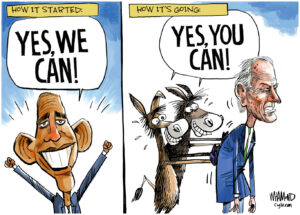On His Own Terms
Let's ask the hard question about the Rev. Jeremiah Wright: Is he as far outside the African-American mainstream as many of us would like to think?WASHINGTON — Let’s ask the hard question about the Rev. Jeremiah Wright: Is he as far outside the African-American mainstream as many of us would like to think?
Because Barack Obama’s speech on race in America was so candid about both the legitimacy of black and white grievances — and the flaws in those grievances — it carries the risk of offending almost everyone.
The man who, by parentage, is half black and half white took it upon himself to explain each side’s story to the other. Obama resembled no one so much as the conciliatory sibling in a large and boisterous family shouting: “Please, please, will you listen to each other for a sec?”
One of the least remarked upon passages in Obama’s speech is also one of the most important — and the part most relevant to the Wright controversy. There is, Obama said, a powerful anger in the black community rooted in “memories of humiliation and doubt” that “may not get expressed in public, in front of white co-workers or white friends” but “does find voice in the barbershop or the beauty shop or around the kitchen table. … And occasionally it finds voice in the church on Sunday morning, in the pulpit and in the pews.”
Yes, black people say things about our country and its injustices to each other that they don’t say to those of us who are white. Whites also say things about blacks privately that they don’t say in front of their black friends or associates.
One black leader who was capable of getting very angry indeed is the one now being invoked against Wright. His name is Martin Luther King Jr.
An important book due out next month on King’s rhetoric by Barnard College professor Jonathan Rieder offers a more complex view of King than the sanitized version that is so popular, especially among conservative commentators. In “The Word of the Lord Is Upon Me,” Rieder — an admirer of King’s — notes that the civil rights icon was “not just a crossover artist but a code switcher who switched in and out of idioms as he moved between black and white audiences.”
Listen to what King said about the Vietnam War at his own Ebenezer Baptist Church in Atlanta on Feb. 4, 1968: “God didn’t call America to engage in a senseless, unjust war. … And we are criminals in that war. We’ve committed more war crimes almost than any nation in the world, and I’m going to continue to say it. And we won’t stop it because of our pride and our arrogance as a nation. But God has a way of even putting nations in their place.” King then predicted this response from the Almighty: “And if you don’t stop your reckless course, I’ll rise up and break the backbone of your power.”
If today’s technology had existed back then, I would imagine the media playing quotations of that sort over and over. Right-wing commentators would use the material to argue that King was anti-American and to discredit his call for racial and class justice. King certainly angered a lot of people at the time.
I cite King not to justify Wright’s damnation of America or his lunatic and pernicious theories, but to suggest that Obama’s pastor and his church are not so far outside the African-American mainstream as many would now suggest. I would also ask my conservative friends who praise King so lavishly to search their consciences and wonder if they would have stood up for him back in 1968.
These are realities that Obama has forced us to confront, and they are painful. Wright was operating within a long tradition of African-American outrage, which is one reason why Obama could not walk away from his old pastor in the name of political survival. Obama’s personal closeness to Wright would have made such a move craven in any event.
I’m a liberal and I loathe the anti-American things Wright said, precisely because I believe that the genius of our country is its capacity for self-correction. Progressivism and, yes, hope itself depend upon a belief that personal conversion and social change are possible, that flawed human beings are capable of transcending their pasts and their failings.
Obama understands the anger of whites as well as blacks, but he’s placed a bet on the other side of King’s legacy that converted rage into the search for a beloved community. This does not prove that Obama deserves to be president. It does mean that he deserves to be judged on his own terms and not by the ravings of an angry preacher.
E.J. Dionne’s e-mail address is postchat(at)aol.com.
© 2008, Washington Post Writers Group
Your support is crucial…With an uncertain future and a new administration casting doubt on press freedoms, the danger is clear: The truth is at risk.
Now is the time to give. Your tax-deductible support allows us to dig deeper, delivering fearless investigative reporting and analysis that exposes what’s really happening — without compromise.
Stand with our courageous journalists. Donate today to protect a free press, uphold democracy and unearth untold stories.









You need to be a supporter to comment.
There are currently no responses to this article.
Be the first to respond.